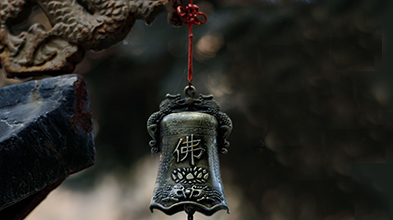Wisdom from Chinese Literary and Buddhist Classics
365 Days for Travelers
8/28: A NEW ACCOUNT OF THE TALES OF THE WORLD: LITERATURE (EXCERPT)
Edited by Liu Yiqing (403 - 444, Liu-Song Dynasty)English translation: Hsin-Yu Huang
Emperor Wen commanded the Prince of Dong’e to write a poem while he took seven steps. Failure to do so would mean execution. Upon hearing this, the Prince composed the following poem:
Boiling the beans to make soup,
Filtering its pulp for pure juice.
Under the cauldron, its stalks are burnt,
While the beans weep from the cauldron.
Originally grown from the same root,
Why in such a hurry for mutual harm?
The Emperor then felt deeply ashamed.
── from Shishuo Xinyu
(A New Account of the Tales of the World)
SELECTIONS FROM DOCTRINE OF THE MEAN
Kong Ji (483 BCE - 402 BCE, Spring and Autumn Period)Edited by Zhu Xi (1130 - 1200, Song Dynasty)
English translation: James Legge
To be fond of learning is to be near to knowledge. To practice with vigor is to be near to magnanimity. To possess the feeling of shame is to be near to energy.
The attainment of the Way requires the extensive study of what is good, accurate inquiry about it, careful reflection on it, the clear discrimination of it, and the earnest practice of it.
The path may not be left for an instant. If it could be left, it would not be the path. On this account, the superior man does not wait till he sees things, to be cautious, nor till he hears things, to be apprehensive. There is nothing more visible than what is secret, and nothing more manifest than what is minute. Therefore the superior man is watchful over himself, when he is alone. While there are no stirrings of pleasure, anger, sorrow, or joy, the mind may be said to be in the state of Equilibrium. When those feelings have been stirred, and they act in their due degree, there ensues what may be called the state of Harmony. This Equilibrium is the great root from which grow all the human actings in the world, and this Harmony is the universal path which they all should pursue. Let the states of equilibrium and harmony exist in perfection, and a happy order will prevail throughout heaven and earth, and all things will be nourished and flourish.
── from Zhongyong
(Doctrine of the Mean)
What's New?
AUGUST

Humble Table, Wise Fare
INSPIRATION
Recorded by Leann Moore 0:17
Live your life
with an even mind.
Examine yourself
with a humble mind.
Cultivate yourself
with a non-abiding mind.
Devote yourself to the Way
with a bodhi mind.

Dharma Instruments
Venerable Master Hsing Yun grants voices to the objects of daily monastic life to tell their stories in this collection of first-person narratives.

Sutras Chanting
The Medicine Buddha SutraMedicine Buddha, the Buddha of healing in Chinese Buddhism, is believed to cure all suffering (both physical and mental) of sentient beings. The Medicine Buddha Sutra is commonly chanted and recited in Buddhist monasteries, and the Medicine Buddha’s twelve great vows are widely praised.

Newsletter
What is happening at Hsingyun.org this month? Send us your email, and we will make sure you never miss a thing!





